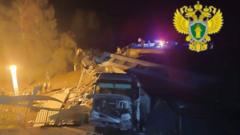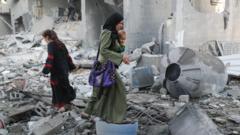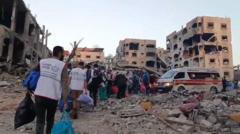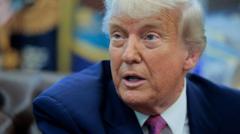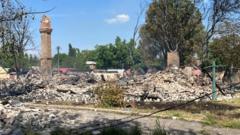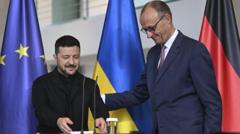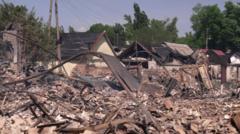As preparations for the second round of peace talks in Istanbul unfold, Ukraine demands details on Russia's ceasefire proposition, emphasizing the imperative for dialogue to end the conflict this year.**
Ukraine Awaits Clarity on Russian Ceasefire Proposal Ahead of Istanbul Meeting**

Ukraine Awaits Clarity on Russian Ceasefire Proposal Ahead of Istanbul Meeting**
Ongoing negotiations push Ukraine for a clearer understanding of Russia's terms before peace talks commence.**
Russia is preparing to send a delegation to Istanbul for a new round of talks with Ukraine, with Kremlin spokesman Dmitry Peskov announcing plans to discuss Moscow's temporary ceasefire conditions in Turkey. Ahead of these discussions, Ukraine has expressed a commitment to continued dialogue but insists it will not send its representatives until it receives comprehensive details regarding Russia's ceasefire proposal.
Foreign Minister Andrii Sybiha highlighted Ukraine's prior submission of its "vision for future steps" to Russia, asserting that a clear and unconditional ceasefire is necessary to facilitate wider negotiations. He conveyed Ukraine's interest in seeing the discussions progress, with a hope to conclude the war by the end of the year.
Should the talks proceed as scheduled, key leaders such as President Vladimir Putin and President Volodymyr Zelensky are not anticipated to attend. Turkish Foreign Minister Hakan Fidan has voiced hopes of eventually organizing a high-level summit involving President Trump, President Putin, and President Zelensky, emphasizing the importance of diplomacy in this conflict.
Peskov mentioned that Russia would consider a summit only if significant progress is made in preliminary discussions. He echoed sentiments from Trump's envoy, retired General Keith Kellogg, on the necessity of maintaining negotiation channels, while also remarking that NATO enlargement concerns should be taken seriously.
In a related note, German Chancellor Friedrich Merz recently informed Zelensky of Germany's readiness to assist Ukraine in producing long-range missiles for its defense against potential future Russian offensives. The Kremlin warned that lifting restrictions on the range of missiles available to Ukraine would be a dangerous shift in policy that could hinder peace efforts.
Currently, Russia controls approximately 20% of Ukraine's internationally-recognized territory, with ongoing tensions that need diplomatic engagement for resolution.

